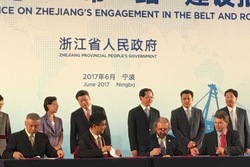
Hancock Prospecting signs agreement with Chinese consortium. Chinese interests now own almost 14.5 million hectares in Australia. (Supplied: Hancock Prospecting)
Chinese investment in farmland soars as politicians urge closer eye on foreign ownership
By Lucy Barbour
There are renewed calls from some in the National Party for the Federal Government to introduce tougher foreign ownership rules, as new figures show China's stake in Australian farmland has increased significantly.
The Australian Tax Office's second annual update to the Federal Government's register of foreign-owned farmland shows Chinese investment has risen from about 1.5 million hectares to almost 14.5 million hectares.
Nationals senator for New South Wales, John Williams, said the Government should "keep a very close eye" on the levels of foreign ownership for the benefit of "food security in the decades ahead".
Despite the concerns, foreign investment in agricultural land dropped last financial year, from 14.1 per cent to 13.6 per cent.
But Senator Williams said concern about foreign ownership remained red hot in National Party heartland, even though the register was set up to provide greater transparency and to quell community angst.
UK the biggest investor, followed by China
The ATO gathers the data, and its latest figures show the United Kingdom remains the biggest investor.
China has jumped from fifth spot to a close second, overtaking the United States.
"I don't care if it's Chinese ownership or whatever ownership," Senator Williams said.
"If they want to develop our country and increase output and exports, very good, but they should put that plan forward to the Foreign Investment Review Board (FIRB) in my book, and show how they're going to do it, and then put it in place."
The jump in Chinese ownership was due to a number of big sales, including the Kidman Cattle empire to mining magnate Gina Rinehart and Chinese company Shanghai Cred.
The joint venture boosted China's ownership stakes by 2.6 million hectares.
Farm gets looked after better by locals, MP says
But Victorian Nationals MP Andrew Broad said sales to overseas investors made it harder for young Australian farmers to get into the property market.
"I purchased a farm when I was 22 and I had to compete against my neighbours to buy the farm," he said.
Currently, bids from companies in China, Korea and Japan are scrutinised by the FIRB whenever they are higher than $15 million.
Mr Broad said that cap should apply to all countries, and he would like it lowered to $5 million.
"If you're a US purchaser of agricultural land you don't have to ask the FIRB's permission to purchase that land if the property is under $1.1 billion, which is ridiculously high," he said.
He described the farm sector's consistent claims that Australian agriculture needs more foreign investment as "wrong".
Register highlights 'need for more investment'
National Farmers' Federation president Fiona Simson refuted Mr Broad's assessment, and said the farm register had improved transparency and highlighted a need for more investment, particularly in northern Australia.
"We've been agnostic at NFF about whether that comes from overseas or whether that in fact comes from onshore Australian investors," she said.
"So I think it's certainly not all about thresholds that we put in and the restrictions around that."
While Ms Simson is not concerned about the overall drop in foreign investment, others like Malcolm Brennan, who advises clients on the FIRB rules for law firm King & Wood Mallesons, are.
Mr Brennan said it was too early to say whether the decrease was a trend, but he questioned why investment had slipped.
"It doesn't have to rise significantly. I'd prefer to see it about the same [but] we need more foreign investment, particularly in the north," he said
But Senator Williams will be lobbying for the Government's farm register to go further, to give Australians more thorough information.
"I think we should get more specific in areas as far as, is it the pastoral country in the west of the NSW, or the Northern Territory or Queensland, or the more settled areas of the farming country where they're actually growing cereal crops?" he said.
"I think more detail needs to put in place so we can keep a very close eye on what is being sold and who owns it."












